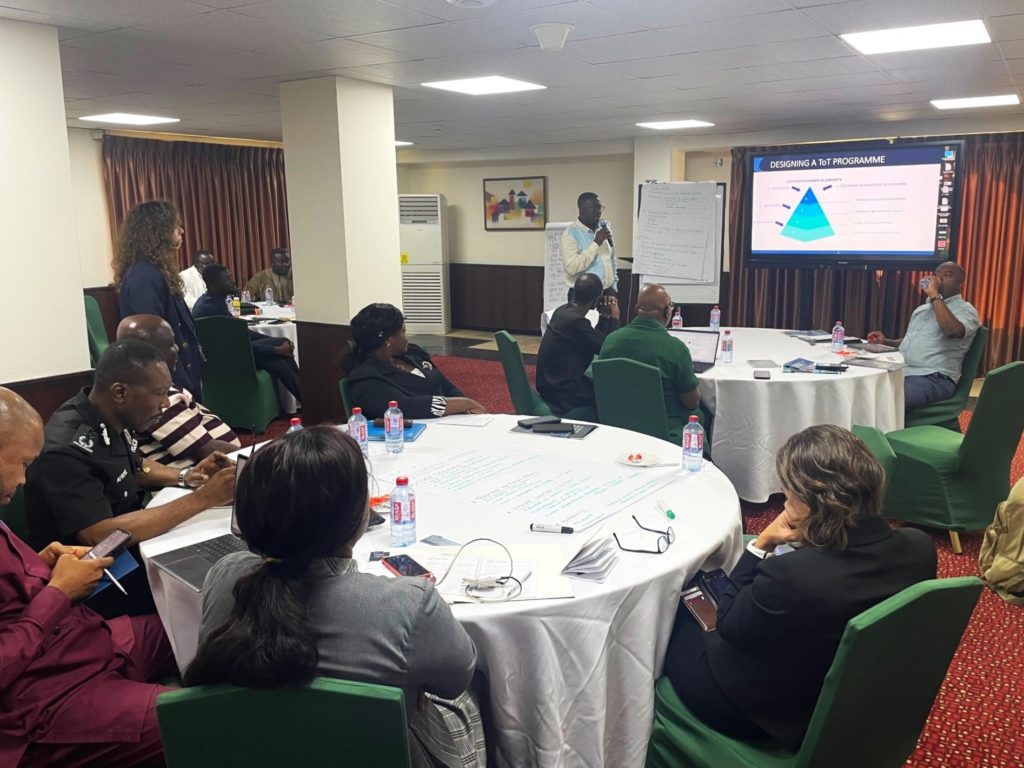STRENGTHENING MULTISTAKEHOLDER ENGAGEMENT IN GHANA’S SECURITY AND EXTRACTIVES SECTOR
Strengthening Multistakeholder Engagement in Ghana’s Security and Extractives Sector
In May 2025, ICoCA was in Ghana, where we co-hosted a one-day multi-stakeholder workshop with the Voluntary Principles Initiative in-country working group. Nearly 40 participants from across the country came together to explore how to strengthen responsible private security practices in the extractives sector. The workshop brought together a diverse mix of stakeholders, including mining companies, private security providers (notably the Association of Private Security Organisations Ghana – APSOG), civil society organisations, the Ghana Police Service (with special thanks to Police Commissioner Daniel Kwame Afriyie, Director-General of Private Security Organisations PSOG), the Ministry of Lands and Natural Resources, the Commission on Human Rights and Administrative Justice, the Australian High Commission and the Kofi Annan International Peacekeeping Training Centre (KAIPTC).
 ICoCA shared how compliance with its Code helps mitigate human rights risks and supports due diligence in private security contracting. Findings from a recent survey on working conditions in the extractive sector were discussed alongside a best practice example from the Geita Gold Mine. A key outcome of the workshop was the co-creation of the foundations of a Train-the-Trainer programme tailored to Ghana, with potential to replicate the model elsewhere. Training is essential to managing risks in private security contracting, but ensuring it meets quality standards, aligns with legal frameworks and fits the local context remains a challenge. This workshop was an important first step towards a pilot ToT programme in Ghana, and we look forward to building it with our partners.
ICoCA shared how compliance with its Code helps mitigate human rights risks and supports due diligence in private security contracting. Findings from a recent survey on working conditions in the extractive sector were discussed alongside a best practice example from the Geita Gold Mine. A key outcome of the workshop was the co-creation of the foundations of a Train-the-Trainer programme tailored to Ghana, with potential to replicate the model elsewhere. Training is essential to managing risks in private security contracting, but ensuring it meets quality standards, aligns with legal frameworks and fits the local context remains a challenge. This workshop was an important first step towards a pilot ToT programme in Ghana, and we look forward to building it with our partners.
While in Ghana, ICoCA also deepened its engagement with government, civil society and private sector actors to advance responsible private security provision. We met with several private security companies, including Yutees security services ltd and LandMark Security Limited, both ICoCA Certified Members. It was encouraging to also connect with G4S Ghana, Omega Risk Solutions, Saladin Security and Protea Coin Ghana to discuss the need to raise industry standards across the country.
Civil society voices were central to our visit. We had insightful discussions with Mutaru Mumuni Muqthar of West Africa Centre for Counter-Extremism (WACCE), an ICoCA CSO Member, and the Coginta team, who shared valuable perspectives on local security challenges and the vital role communities play. Engagement with public institutions was equally important. ICoCA had the privilege of discussing future collaboration with the Ghana Police’s PSOG Directorate, one of the country’s two private security regulators. Our conversation with Colonel Felix Korbieh of the Ghana Armed Forces highlighted the urgent need to educate stakeholders on aligning national efforts with international frameworks like the Code – an issue also addressed in a PSC-focused training course convened by KAIPTC in early June. 
In parallel, promising discussions with the Ghana Standards Authority opened the door to advancing ISO 18788 adoption, an important step towards stronger regulatory alignment.
The Australian High Commission in Ghana is championing fair wages for security staff, an essential foundation for a rights-respecting and motivated workforce. ICoCA would like to recognise the High Commission’s leadership in raising industry standards and hopes its efforts will inspire other government missions to take up this important cause. As recently seen in Uganda, overworked, poorly treated and underpaid security personnel can quickly become disgruntled, posing a serious risk to both employers and clients.
ICoCA’s mission to Ghana coincided with both the West Africa Mining & Power Expo and the inaugural Mining In Motion Summit, where we participated actively. Security featured prominently at both events. With rising global demand for gold and transition minerals, and corresponding increases in commodity price, illegal mining (Galamsey) is on the rise. Individuals involved in illegal gold mining can earn between 1,000 and 2,000 Cedis a day, more than twice the monthly minimum wage. This has led to increasing conflict between illegal miners, the criminal networks behind them and large-scale mining operations, evidenced by serious incidents in Obuasi and Ahafo South earlier this year.
Galamsey is also driving deforestation in Ghana’s national forest reserves and the pollution of water bodies, with mercury and cyanide commonly used as inexpensive methods for gold extraction. New government initiatives – including the Blue Water Guards and community eco-police – along with responsible private security, will be crucial for safeguarding people and the environment, while enabling lawful mining operations.
ICoCA looks forward to continuing its collaboration with all stakeholders to promote responsible private security, a key pillar of stability in this complex environment.
